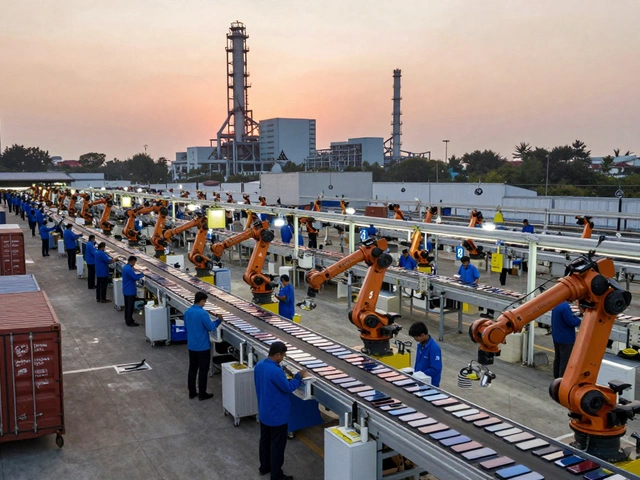Ford's Strategic Shift and Its Impact on India's Automotive Sector

In a significant move that's sending ripples across the automotive industry, Ford Motor Company has decided to halt its vehicle production in India. This decision isn't happening in isolation but is part of a broader global restructuring strategy aimed at optimizing operations and curtailing losses. For years, Ford tried to carve out a slice of prosperity in the Indian market, but consistent financial losses have overshadowed these efforts.
The company's exit decision means a transition away from manufacturing plants located in Tamil Nadu and Gujarat, affecting not only its industrial footprint but also the livelihoods connected to its operations. As we delve into the ramifications of Ford's pullout, it's essential to understand what this means for both the automotive market and the broader industrial community. With a competitive landscape where domestic and other foreign automakers vie for consumers, Ford's retreat presents both challenges and opportunities.
As Ford shifts gears, it's crucial to take stock of how this decision reverberates through the Indian economy, influences employment across regions, and affects consumer options. The journey of an iconic automaker reconsidering its presence in an emerging market highlights many aspects of global business dynamics.
- Background and Reasons for Ford's Exit
- Impact on the Indian Automotive Market
- Effects on Employment and Local Economies
- Consumer Choices and Future Outlook
Background and Reasons for Ford's Exit
The presence of Ford in the Indian market has long been a symbol of industrial ambition and global reach. Despite the rich history and strategic importance, Ford India exit is a headline that has captured attention worldwide. To comprehend the reasons behind this decision, one must delve into a complex web of financial, operational, and strategic considerations.
Initially, India's booming population and emerging middle class offered a promising landscape for automotive growth. Ford, like many other global automakers, had high hopes, establishing significant production facilities in Chennai and Sanand to serve not just the local market but potentially export in the region. Yet, despite over two decades in the country, the company failed to gain a substantial foothold in an intensely competitive market. The stiff competition from well-established players like Maruti Suzuki and Hyundai, who dominate the market share in affordable and compact car segments, stymied Ford's growth.
Financial performance has been a crucial factor in this decision. Over the last decade, Ford has reportedly accumulated operational losses exceeding $2 billion in India. These losses were symptomatic of broader challenges, including underutilized capacity. As factories in Gujarat and Tamil Nadu operated below half their capacity, the fixed costs weighed heavily on margins. Such financial burdens made it difficult for Ford to justify continued investment in a market where it had no clear path to profitability. This economic backdrop was compounded by Ford's broader global strategy to streamline operations and focus on profitable ventures.
"After more than accumulated operational losses of over $2 billion during the past decade and 17,000 onboard employee cuts, Ford expected to have the strong business case for the decision," said Jim Farley, Ford's CEO, expressing the hard reality facing the automaker.
Market dynamics in India also presented unique challenges. Consumer preferences have gradually shifted towards utility vehicles like SUVs, a segment where Ford's lineup often found tougher competition. Additionally, economic indices such as fluctuating currency, erratic policy shifts, and changing regulatory landscapes further inhibited a stable business environment. The Indian government's changed priorities towards electric vehicles necessitated significant investments, requiring tasks and transformations Ford wasn't prepared to commit to in this precarious market.
Finally, an evolving global paradigm shift has prioritized sustainability and innovative technology. Ford has signaled intentions to reforge its brand and product lines over the coming years, focusing on electric and autonomous vehicles. With the need to balance resources effectively, India—as disappointing as it may be—has been deprioritized in pursuit of technological advancement and financial prudence.
Understanding Ford's exit requires looking not just at the surface metrics, but at the intricate interplay of global competitiveness, local market challenges, and the strategic evolution of the auto industry. The company's retreat highlights a period of introspection for all players hoping to thrive in a rapidly changing automotive landscape.

Impact on the Indian Automotive Market
Ford's decision to stop production in India sends ripples through the country's vast automotive market. This market, often considered one of the most competitive globally, suddenly finds a void where a major player once operated. The implications are multifaceted, touching on production dynamics, market competition, and perhaps most importantly, consumer trust. In a landscape where Indian consumers have their pick of local brands like Tata Motors and international names like Hyundai and Maruti Suzuki, the absence of Ford creates both an opportunity and a challenge. New players may vie to capture Ford's erstwhile market share, capitalizing on their strengths in small and mid-sized segments that resonate with the Indian buyer's budget and preferences.
One area that demands attention is the potential knock-on effect on pricing strategies and the feature offerings of vehicles. With Ford out of the equation, existing manufacturers might feel less pressure to innovate swiftly or competitively price their models. This could lead to a market of limited choice, where consumers pay more for fewer features—an ironic outcome in such a rich and diverse consumer landscape. Analysts have observed shifts in consumer behavior following such exits in the past, noting an extension in product cycles and a possible stagnation in technological advancements.
As per a report by the Society of Indian Automobile Manufacturers, India’s automotive sector remains a significant marker of the nation's industrial prowess. Yet, Ford's exit underscores how volatility continues to affect even the biggest players. This departure might ease the congestion of brands vying for consumer attention, yet it simultaneously emphasizes the challenges that remain in this billion-dollar industry.
"Ford's exit is more than just a company leaving; it's a punctuation mark in a broader economic narrative," states a senior analyst from the automotive consultancy firm JATO Dynamics.The ripple effects, therefore, are apt to shape strategies not just for manufacturers, but for retailers and financiers who play integral roles in the auto sales lifecycle.
Moreover, there's speculation about how this move will impact India's quest to become an export hub, particularly amidst a global push toward electric mobility. The government has been vocal about its ambitions for India to emerge as a leading player in the shift towards electric vehicles (EVs), a move that could be hampered without participation from major global automakers. With Ford's plants now dormant, the vacuum might slow down progress unless robust policy frameworks and partnerships rise to fill this gap. Competitors are likely to jockey for position, potentially leading to a reshuffling of resources and priorities within the industry, especially concerning sustainable automotive technologies.
The ramifications extend beyond immediate economic impacts, touching on the environmental aspirations vested in emerging automotive technologies. The coming months, thus, will be crucial in assessing how Ford's exit reverberates through these spheres, influencing not just the present climate but also the long-term direction of India's automotive aspirations.

Effects on Employment and Local Economies
The decision by Ford to cease production in India transcends the boundaries of a mere business move, creating ripple effects that may alter the livelihoods of many. The closure of its manufacturing plants in Tamil Nadu and Gujarat is set to have a profound impact, primarily on the local workforce directly associated with Ford's facilities. Thousands of auto-sector jobs are at stake, spanning roles in assembly lines, engineering, logistics, and even administrative support positions. For a region heavily reliant on automotive employment, this exit not only risks reducing household incomes but also strains community resources and support systems.
The economic implications extend beyond direct employees. Local economies have, for years, built symbiotic relationships with the manufacturing giant, with small businesses and suppliers forming the backbone supporting the primary operations. Shops, eateries, and local service providers around these plants are now facing uncertainty, which could lead to a downturn in local commerce. Additionally, secondary supply chain industries, which include those that provide parts and materials to Ford, are expected to feel the pinch, potentially reducing job opportunities across sectors.
Moreover, the decision has sparked conversations around industrial policy and the sustainability of foreign direct investments in India's automotive market. Analysts argue that the exit underscores a necessary introspection into market conditions and policy frameworks that need adjustment to ensure the viability of global auto manufacturers in the region. The future for the employees affected by this decision remains a heated topic of debate, with local governments and Ford attempting to devise reemployment or reskilling programs to aid displaced workers. This effort is crucial because transitioning a skilled workforce towards new opportunities is often fraught with challenges.
Insights drawn from the situation suggest that such realignments aren't uncommon in the global economic landscape, driving home the importance of diversified local economies. Future strategies that include fostering innovation, bolstering alternative industries, and enhancing infrastructural investments could provide a buffer against such economic shocks. Yet, the immediate focus remains on mitigating the adverse effects on individuals' lives caused by Ford's departure. In this evolving paradigm, communities continue to rally together, advocating for sustainable solutions that build long-term resilience.
"The challenge is not just about economic numbers; it's about people, their skills, and their livelihoods," remarked an economist from a leading think tank in an interview about the implications of Ford's exit.

Consumer Choices and Future Outlook
The exit of a major player like Ford from the Indian market creates ripples not only in the industry but also among consumers who have been loyal to the brand or are in search of durable and reliable vehicles. With Ford India exiting from local manufacturing, the direct implications for consumers revolve around reduced options and potentially higher dependency on pre-owned vehicles from the brand. Although Ford promises continuity in service support for its existing car owners, the confidence in purchasing new Ford models may inevitably see a decline as availability diminishes.
This strategic market departure reshapes the landscape of Indian automobile manufacturing. Domestic giants like Tata Motors and Maruti Suzuki, along with foreign counterparts like Hyundai and Kia, might aim to fill the void left by Ford, aggressively vying for market shares, previously enjoyed by the American brand. This competitive spirit could lead to an increase in product innovation, affordable pricing strategies, or enhanced after-sales services, providing potential benefits to the consumer.
Shift in Market Dynamics
One might wonder how this reshaping influences more than the brand loyalties and choices. The Indian automotive scene is particular, with consumers often balancing aspirational factors with economic pragmatism. Ford's style was often appreciated for its robust build and driving experience, hence competitors might need to tweak their offerings to attract a like-minded audience. As estimated by industry insiders, companies might intensify focus on SUVs and crossover segments since Indian consumers show an increasing appetite for these categories.
According to a recent report by the Society of Indian Automobile Manufacturers, consumers are increasingly discerning, and their purchase decisions are significantly influenced by factors such as fuel efficiency, technological integration, and reputations built around customer service. With Ford stepping back, other manufacturers could seize the moment to reinforce their standings by investing in hybrid and electric vehicles, aligning with the global shift towards more sustainable transportation solutions.
"Change and disruption in the automotive sector, whether it be through a brand's exit or the introduction of new technologies, often lead to a remarkable set of opportunities and challenges,” stated Rajesh Menon, the director-general of a prestigious automobile association.
Rajesh emphasizes that such transitions open doors to strategic innovation while testing companies on their adaptability.Expect an increased influx of technology-fueled cars that appeal to tech-savvy younger demographics, who are becoming a pivotal segment in recent market trends.
Future Trajectories in Automobile Preferences
The evolution post-Ford's leave may also guide the entry of fresh players attempting to penetrate the market while adhering to value-driven business models suitable for Indian consumers. It's an opportunity for newcomers to re-invent choices with sustainable impacts and align them with the burgeoning needs and aspirations of this evolving market. As India solidifies its place on the global automotive map, the potential lays wide open, awaiting keen investors keen on bridging the gap Ford has left.
This insightful look into the consumer choices and consequential shifts post-Ford reminds us that in any industrial domain, especially in the realms of automobile manufacturing in India, the resilience of some incumbents, along with the strategic dynamism of newcomers, often writes the next chapter of vehicular culture. As the Indian roads prepare for a new era of motorized stories, the evolution of the roads we drive on becomes more than just a metaphor—a compelling reality, ripe for consumers to embrace.




